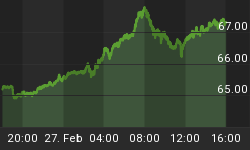Gold, Stocks & Oil Drop Hard Against "Safe Haven" Dollar, "Support is Close"
THE PRICE OF GOLD fell sharply against a strong US Dollar on Monday morning, falling through what one Asian dealer called "technical and psychological support at $942" to record the lowest Gold Fix so far this month at $937.50 an ounce.
The "safe haven" flight to US Dollars also pushed crude oil back below $66 per barrel, while base metals and silver lost more than 3%.
Adding to Friday's 0.7% loss despite news that France and Germany crept out of recession between April and July, world stock markets sank 1.4% early Monday on average - the biggest one-day loss in more than six weeks - after Japan reported 0.9% growth in its second-quarter GDP.
Government bond prices rose, pushing the yield offered to new buyers lower. Ten-year UK gilt yields fell to 3.63%, their lowest level since mid-June.
"There is definite downside risk despite Gold's uptrend," say London market-makers Scotia Mocatta.
"Support is close however, and comes in at $932.40."
Commerzbank reckons the last 6 weeks' uptrend is now "exposed", advising in its latest note that "a slide back below channel support should be enough to confirm...the gold market is back under pressure, targeting $925 and then the $904.80 support."
Ex-Dollar, however, the Gold Price was little changed early Monday, rising to £575 an ounce for UK investors and holding above Friday's one-week low against the Euro at €664.
The European currencies also sank against the Japanese Yen, sliding below ¥154 and ¥133 respectively.
The Nikkei stock index meantime dropped 3.1%, unwinding the last two weeks' gains.
Gold Prices at the Japanese Tocom exchange dropped 1.0% to close Monday at ¥2,873 per gram, a new one-month low.
Latest data from the US Gold Futures and options market show speculators reducing their bullish bets on the metal as the price slipped last week.
As a proportion of all hedge-fund and other speculative positions, however, bullish bets rose to their greatest level since the end of 2007. The volume of those bets is smaller by more than one tenth.
Bloomberg's weekly survey of professional gold traders and analysts says that only 13 out of 27 interviewed last Friday expect the Gold Price to rose this week.
"[Gold's drop] is all on the back of the Dollar," says Walter de Wet at Standard Bank, speaking to the newswire today by phone.
"If the Dollar continues to strengthen, it's going to mean lower for the Gold Price."
"If investors want to benefit from gold's performance regardless of the currency," claims Stephan Mueller of gold trust-fund promoters Julius Baer, "the logical thing to do is to neutralize the unwanted currency effect with currency hedging."
"Not surprisingly," says the Investor's Chronicle magazine, "he notes that the currency-hedged Julius Baer Physical Gold Fund does just this."
European gold owners hedging their currency against the Dollar would also have incurred extra costs to little end, BullionVault data show, since the metal has also tripled against Euros, Sterling and Swiss Francs over the last ten years, more than doubling since this point in 2004.
Swiss private-bank Julius Baer also offers structured products in gold, promising to return 100% of investors' capital even if the Gold Price falls.
On Friday the UK's Financial Services Authority said that it's extending a review of structured products linked to the collapse of Lehman Brothers - a major player in underwriting such derivative products - after the ombudsman received 150 complaints from investors in Lehman-backed structured products.
Elsewhere in financial services today, Britain's retail banks need to close one-in-three of their UK branches or face a 50% drop in return on equity, concludes a new study by consultancy group Bain.
In the United States, reports AP, retail banks added a "breath-taking" 10,000 branches in the last 5 years, squeezing margins across the setor.
The cost of rescuing savers at the 102 banks that have failed so far since the credit crunch began in August 2007 now averages 25% of assets, data from the Federal Deposit Insurance Corpoation (FDIC) shows.
During the last US banking downturn of 1989 to 1995, that figure was 19%, but "Compared to the savings-and-loan crisis, banks these days have gotten much bigger and the economy has gotten much bigger," says Bob Patten, analyst at Morgan Keegan & Co.
Today in Luxembourg, the European Commission approved the German government's €7 billon ($9.9bn) rescue of IKB Deutsche Industriebank AG.
One of the first German banks hit by the banking recession in 2007, IKB failed due to large losses on structured investment products, Reuters says.















